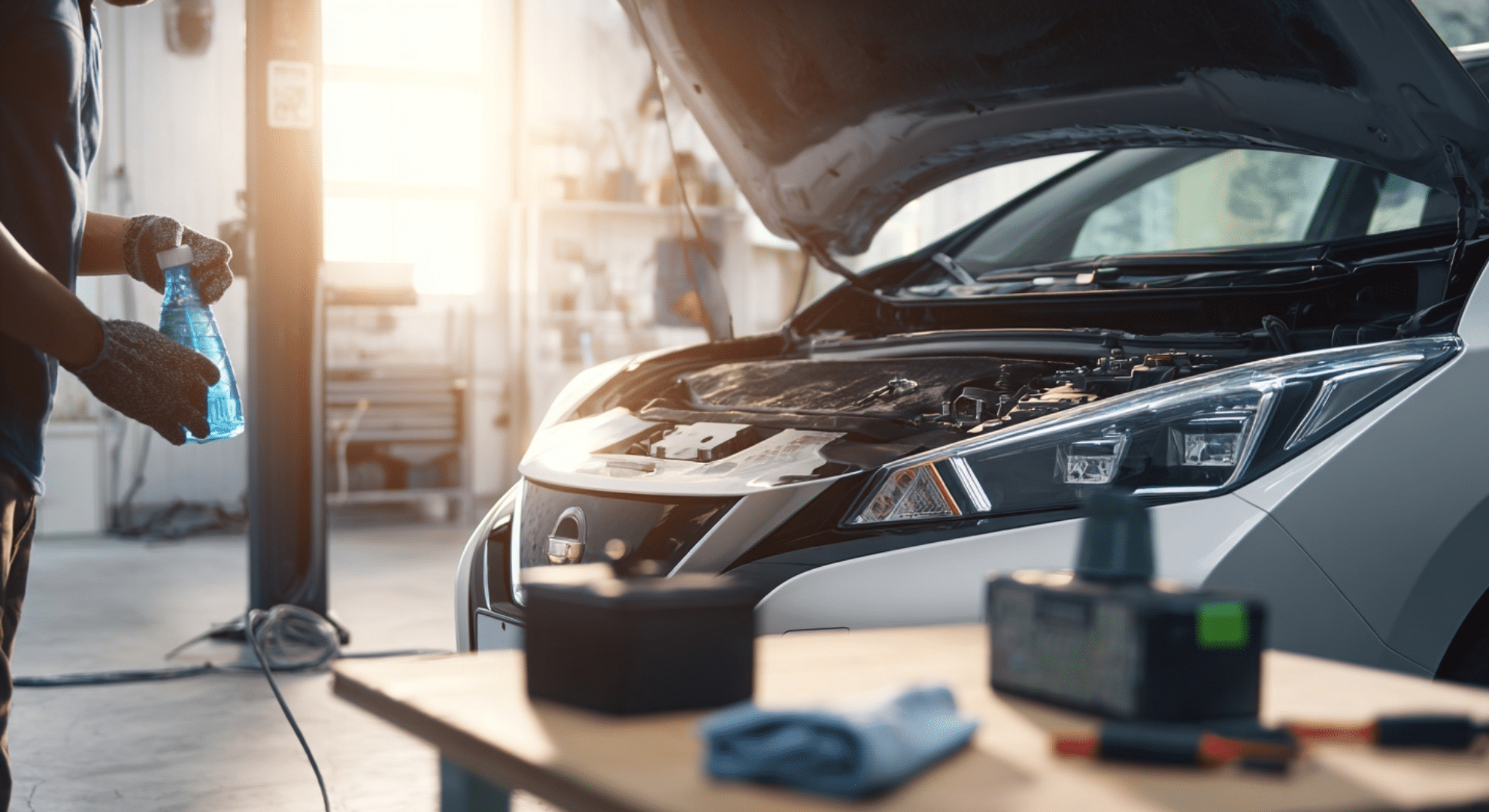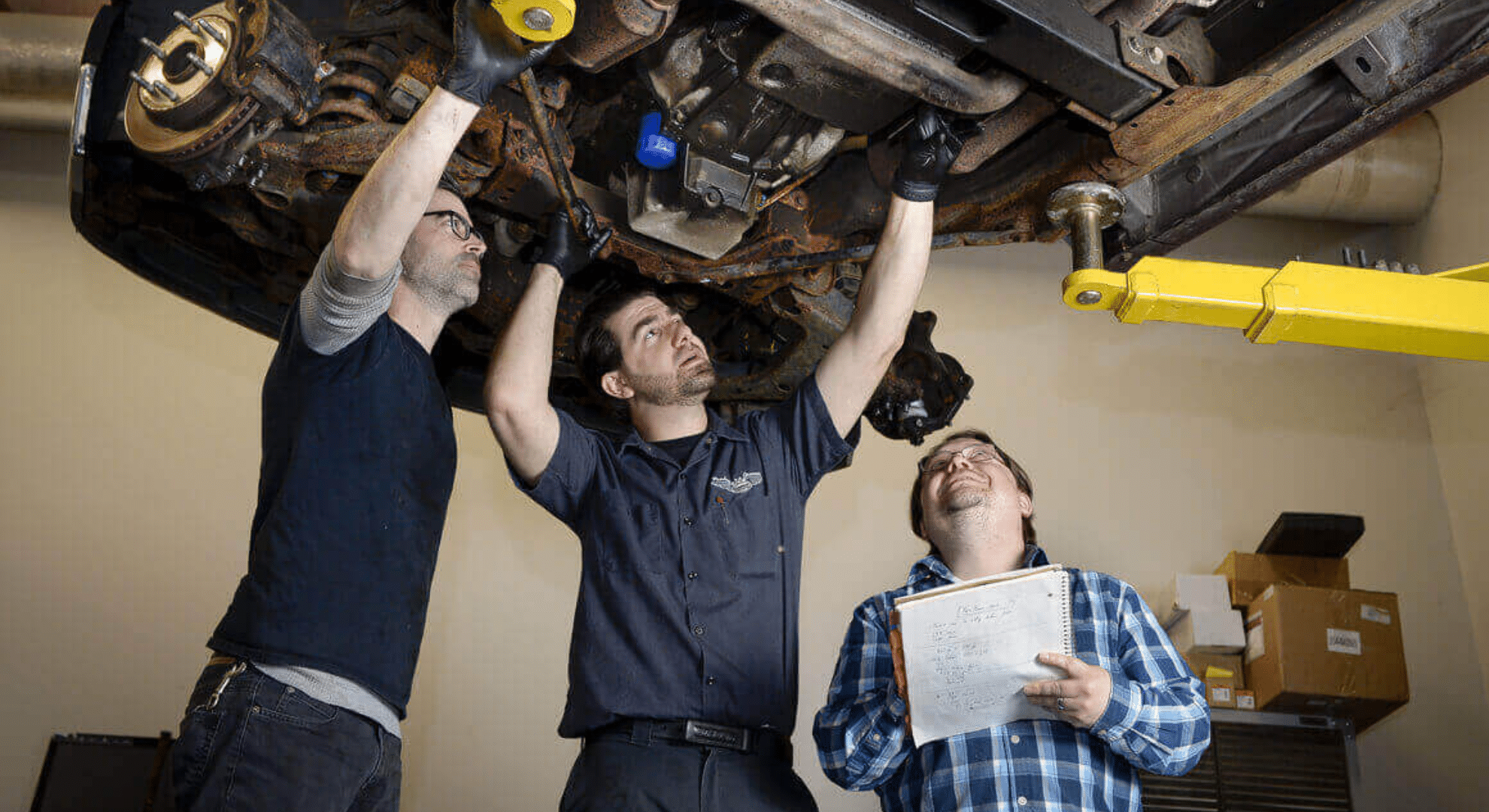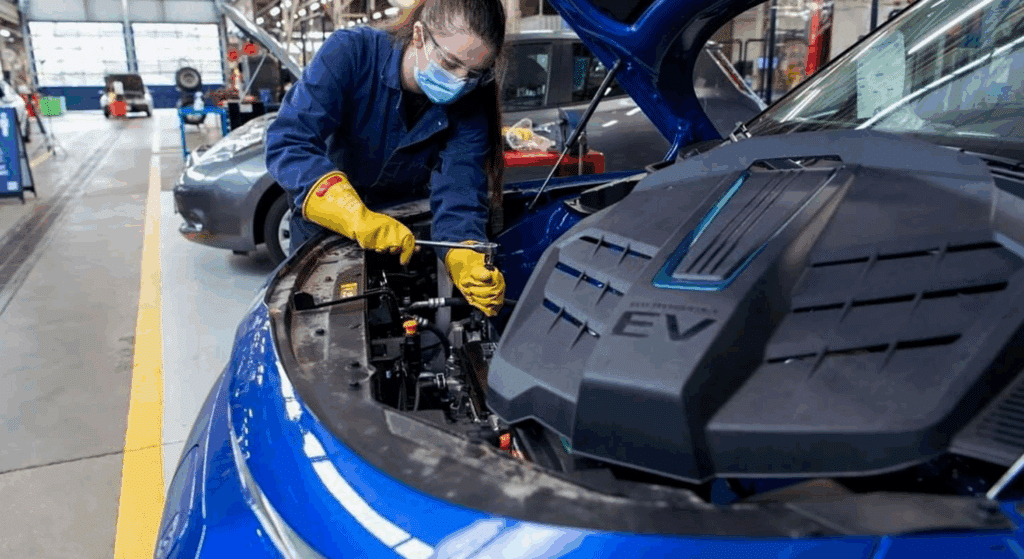Electric vehicle repair caught my attention when I realized how different it is from working on a gas car. There’s no oil to change or engine to tune, just batteries, inverters, and software keeping everything running.
Once I learned that, I wanted to understand how these systems are maintained and what really happens during repairs.
If you’re wondering the same, this guide will walk you through everything you need to know. You’ll learn how EVs differ mechanically, which issues come up most often, and what tasks you can safely do yourself.
You’ll also see why specialized training matters and how technology is reshaping the repair process. By the end, you’ll feel more confident about maintaining your own electric vehicle.
What Makes Electric Vehicle Repair Different From Regular Car Repair?
Electric vehicle repair is quite different from regular car repair because EVs have unique mechanical systems. Instead of a gas engine, they rely on a large battery pack, an electric motor, and an inverter to power the car.
A senior mechanic at Tesla told me –
These parts operate under high voltage, which means technicians need special training, insulated tools, and safety gear to handle them safely. Not all mechanics are certified to work on electric vehicles due to the technical and safety requirements.
While gas cars need oil changes, spark plugs, and exhaust system checks, EVs focus on battery diagnostics, software updates, and cooling system maintenance.
In short, traditional repair shops handle combustion engines and moving parts, but EV repair revolves around electronics, software, and power management, making it far more specialized and technology-driven.
Common Electric Vehicle Problems and How They’re Fixed
Electric vehicles are reliable, but they still face unique repair needs. The most common issues include battery degradation, software glitches, charging port malfunctions, and problems with the regenerative braking system.
Battery issues often show up as reduced driving range or slow charging. In most cases, technicians can reprogram the system or replace faulty battery modules. Software faults, another frequent problem, are usually fixed through system updates or resets.
Charging port failures may need connector replacements or recalibration to restore proper charging.
You might need an EV repair if you notice slower acceleration, unusual noises, charging interruptions, or warning lights on the dashboard. Fortunately, many EV problems—especially those involving the battery, motor, or power electronics are covered under manufacturer warranties.
This makes professional EV servicing essential for maintaining safety and long-term performance.
Electric Vehicle Repair Costs Explained: What You’ll Pay and Why
Electric vehicle repair costs can be both higher and lower than traditional cars, depending on the type of issue.
While EVs save you money on regular upkeep like oil changes or transmission service, they can be pricey when it comes to specialized parts or electrical repairs.
Understanding where these costs come from helps you plan for long-term maintenance and avoid surprise bills.
Average EV Repair Costs vs. Gas Vehicles
In general, electric vehicles cost less to maintain but more to repair.
A study by Consumer Reports found that EV owners spend about 50% less on maintenance over time because there are fewer moving parts—no oil filters, spark plugs, or fuel systems.
However, when a major component fails, repair costs can rise quickly. For example, an inverter or battery replacement can cost far more than a standard engine repair on a gas car.
Cost Breakdown by Major Parts
- Battery: The battery pack is the most expensive component in an EV. Replacements can range from $5,000 to over $15,000, depending on the make and model. Luckily, most batteries are designed to last 8–15 years and often come with long warranties.
- Cooling System: EVs use a liquid cooling system to keep the battery and motor at safe temperatures. Repairs here are usually moderate, typically ranging from $300 to $1,500, depending on parts and labor.
- Electrical System: Components like inverters, onboard chargers, and high-voltage cables can be complex and costly to fix. Repairing or replacing these parts might run from $1,000 to $5,000.
- Tires: EVs are heavier than gas cars and have instant torque, which causes faster tire wear. You might replace tires more often, costing $800 to $1,200 for a full set.
Why EV Repairs Can Cost More
Electric vehicle repairs can cost more because they require specialized training, tools, and safety equipment.
High-voltage systems need certified technicians who understand how to safely disconnect and service components. Additionally, EV parts are not as widely available as traditional auto parts, which can increase prices and repair times.
Advanced diagnostic tools are also needed to detect electrical or software-related faults, adding to labor costs.
How to Lower Your EV Repair Costs
You can keep repair expenses low by following a few smart maintenance habits:
- Keep software updated: Regular updates fix bugs and improve system efficiency.
- Schedule routine inspections: Check the battery, brakes, and tires at least twice a year.
- Use warranties: Most EVs include long-term coverage on batteries and powertrains.
- Choose EV-friendly insurance: Some insurance plans offer lower premiums for electric cars.
- Drive efficiently: Avoid harsh acceleration to extend tire and battery life.
By understanding how EV repair costs break down and taking preventive steps, you can enjoy the benefits of electric driving without unexpected expenses.
Electric Vehicle Maintenance: Should you DIY or Not?


Electric vehicle maintenance, or EV maintenance, is generally simpler than caring for a gas-powered car, but it still requires attention and caution.
While you can handle a few routine tasks yourself, anything involving the high-voltage system should always be left to certified professionals.
Knowing the difference helps you keep your EV in top shape and avoid costly or dangerous mistakes.
High-Voltage Tasks for Certified Professionals
Anything involving the battery pack, inverter, or electrical system should never be done at home. These components carry dangerous voltage levels that can cause serious injury if handled improperly.
Certified EV technicians use insulated tools and follow strict safety protocols to diagnose or repair electrical faults. Attempting these repairs on your own could void your warranty or damage the vehicle’s internal systems.
Easy DIY Electric Vehicle Maintenance Tasks
There are several basic maintenance jobs you can safely do at home:
- Tire Rotation: Rotate your tires every 5,000–7,000 miles to ensure even wear and extend lifespan.
- Fluid Checks: EVs still need brake fluid, windshield washer fluid, and coolant for the battery and motor. Keep these topped up according to the manufacturer’s schedule.
- Cleaning Battery Terminals: Dust and corrosion can build up over time. Gently clean terminals with a dry cloth or a soft brush.
- Cabin Air Filter Replacement: You can easily replace this filter every 12–18 months to keep your cabin air fresh.
These simple steps help your vehicle run smoothly and prevent small issues from turning into expensive repairs.
Routine Care to Prevent High Repair Bills on your EV
Regular maintenance helps prevent big repair costs later. Keep your software updated, charge your EV properly, and monitor any warning lights or performance changes.
Store your car in a moderate climate when possible, since extreme heat or cold can shorten battery life.
By handling simple tasks yourself and leaving complex ones to trained experts, you can extend your EV’s lifespan, maintain safety, and save money over time.
Can Any Mechanic Work on an Electric Car?
Not every mechanic can work on an electric car. EV repair requires specialized training, safety knowledge, and tools that go far beyond what’s needed for traditional gas vehicles. Working on high-voltage systems without proper certification can be dangerous for both the technician and the vehicle.
Electric vehicles operate with high-voltage batteries and complex electrical systems. Certified EV technicians are trained to safely disconnect power sources, prevent electrical shock, and handle specialized components like inverters and battery packs. Without this expertise, even a small mistake can lead to serious injury or costly damage.
EV training covers a wide range of topics, from electrical theory to hands-on repair work. Technicians learn about:
- High-voltage safety procedures
- Battery management systems and thermal control
- Use of diagnostic tools and software updates
- Component replacement and insulation testing
These skills help ensure repairs are done accurately and safely, maintaining the integrity of the vehicle’s electrical system.
Reliable Certification Programs to Verify your EV’s Technician
If you want to verify a technician’s qualifications, look for certifications from trusted sources such as:
- ASE (Automotive Service Excellence) Light Duty Hybrid/Electric Vehicle Specialist (L3)
- Manufacturer (OEM) Training Programs from brands like Tesla, Ford, or Toyota
- EV Technician Training Programs offered by community colleges or trade schools
These programs ensure mechanics understand EV systems thoroughly and meet safety standards. Choosing a certified technician not only protects your car but also ensures the repair is done right the first time.
How to Find a Trusted EV Repair Shop Near You?


Finding the right place for electric vehicle repairs can be tricky, especially since not all shops are equipped for EVs. To ensure your car gets proper care, it’s important to choose from certified EV service centers with the right training, tools, and experience.
Start by checking whether the shop’s technicians are certified to handle electric vehicles. Look for ASE L3 or manufacturer-specific certifications that confirm they’ve completed EV safety and diagnostic training.
The shop should also have specialized tools for high-voltage systems, battery testing equipment, and software for your car’s brand.
Customer reviews, warranty options, and transparent pricing are also good indicators of reliability.
Before scheduling a visit, ask a few key questions:
- Do your technicians have EV-specific certifications or OEM training?
- Have you serviced my car’s brand or model before?
- What safety procedures do you follow for high-voltage systems?
- Do you offer warranties on parts and labor?
- How long do typical EV repairs take?
These questions help you gauge expertise and ensure your car is in safe hands.
Independent EV Shops vs. Dealership Repairs
Independent EV shops can be a great choice for out-of-warranty vehicles because they often offer lower prices and more flexible scheduling. However, dealerships typically have brand-specific tools, original parts, and direct access to software updates.
If your EV is still under warranty, a dealership may be the safer bet. For older models or routine maintenance, a reputable independent EV shop can provide excellent service at a better value.
By doing a bit of research and asking the right questions, you can find a trusted EV repair shop near you that keeps your car running safely and efficiently.
The Future of Electric Vehicle Repair and Maintenance
The future of electric vehicle repair and maintenance is being shaped by new technology and policy changes. Right-to-repair laws are expected to give EV owners and independent shops more access to diagnostic data and repair manuals, making it easier to service vehicles outside dealerships.
Artificial intelligence and remote diagnostics are also transforming repairs. Many EVs can now detect faults automatically and send updates or fixes through software, reducing the need for in-person visits. Over time, AI will help predict problems before they cause breakdowns.
Manufacturers are also shifting toward modular designs, where components like battery packs or inverters can be replaced individually instead of as whole systems. This approach could significantly lower future repair costs and waste.
Together, these advancements promise a more accessible, efficient, and affordable future for EV owners—one where technology and regulation work hand in hand to simplify maintenance.
Conclusion
Electric vehicle repair taught me that staying informed makes ownership easier. I’ve seen how a little knowledge about batteries, software, and certified service centers can save both time and money.
It’s helped me feel more confident about handling small maintenance tasks and knowing when to call a professional.
Now it’s your turn to put that insight to work. Keep an eye on your EV’s health, ask questions at every service visit, and use your warranty when needed. Remember, understanding your car’s unique systems keeps it running longer and more efficiently.
If you found this helpful, keep learning, check out other blogs on the website for more practical tips on EV care, maintenance, and everyday driving confidence!

